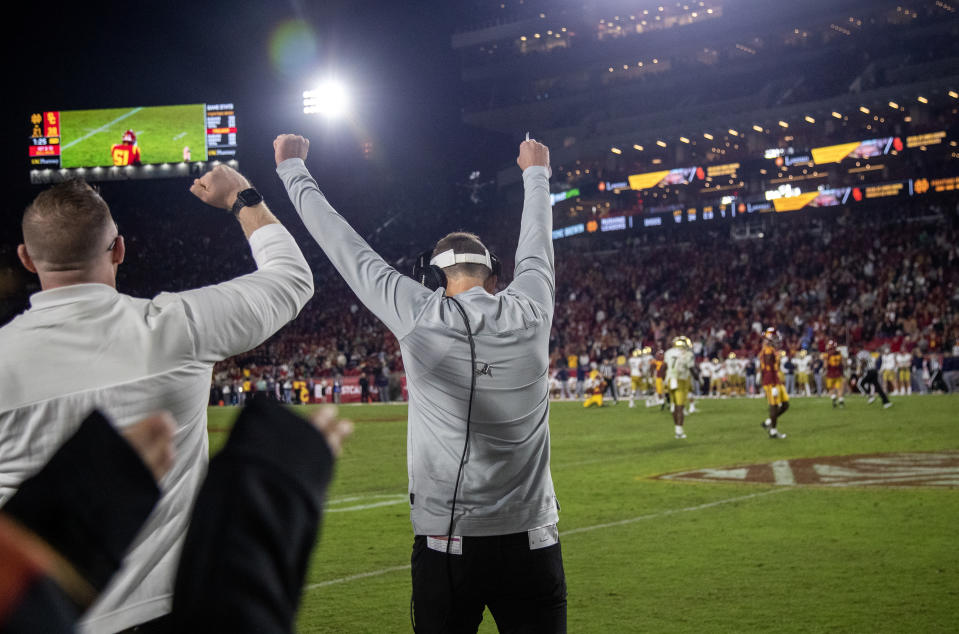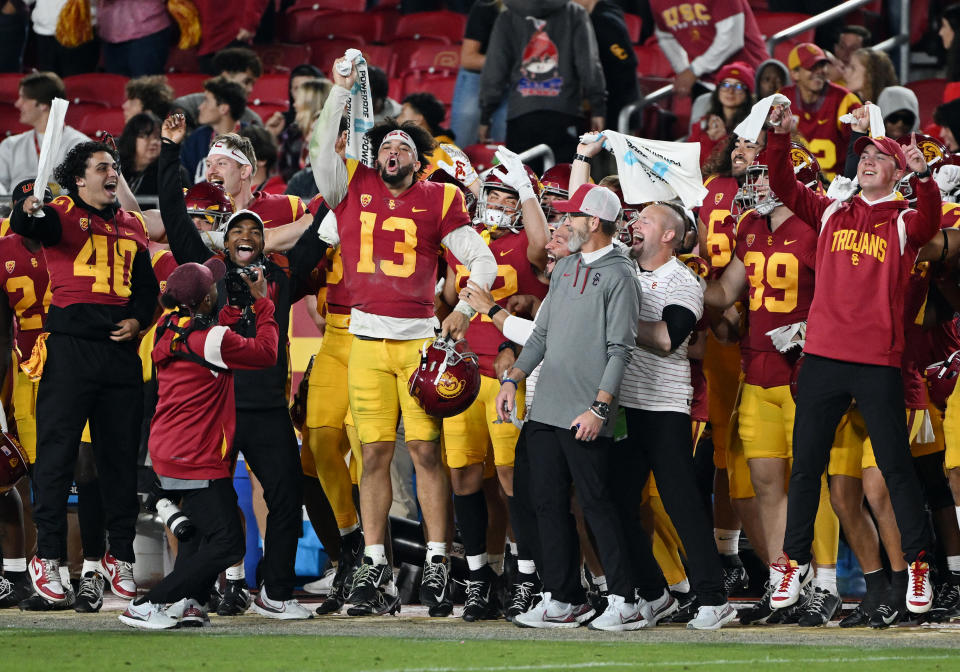LOS ANGELES — At the end of USC’s convincing victory over Notre Dame on Saturday night, a familiar chant echoed around the Coliseum.
We-are-SC! We-are-SC! We-are-SC!
For the first time in a long time, those words rang true. Long-dormant USC at last resembles the USC of old again.
The Trojans are 11-1 and ranked No. 4 in the AP poll, the highest they have climbed this late in the season since the height of Pete Carroll’s tenure. They likely need only to avenge a previous loss to Utah in Friday’s Pac-12 title game to advance to the College Football Playoff.
Their coach might be the sport’s shrewdest offensive mind. Lincoln Riley is a proven winner with a track record of helping elite quarterbacks squeeze the most out of their physical gifts. Their quarterback followed Riley from Norman, Oklahoma, and has emerged as the runaway favorite to win the Heisman Trophy. Caleb Williams is a headband-wearing Houdini in the pocket with a knack for making improvisational magic with his arm or his feet.
Williams has a star quality that no USC player has possessed since Matt Leinart was directing game-winning drives and Reggie Bush was zigzagging through defenses. On Saturday, a season-best crowd of 72,613 braved traffic-gnarled freeways to watch Williams and the Trojans. They roared in appreciation of every downfield dart Williams delivered and every seemingly certain sack he escaped.
Will.i.am, the Grammy award-winning rapper and songwriter, cheered from the USC sideline as Williams made Notre Dame pass rushers look silly. So did an array of Trojan legends including Keyshawn Johnson, Brian Cushing and Willie McGinest.
“No disrespect to our fans,” USC junior defensive lineman Tuli Tuipulotu said, “but that was the first time I’d seen that many people in the stands going crazy, being loud throughout the whole game.”
Riley agreed, describing the energy at the Coliseum on Saturday night as reminiscent of USC’s glittering past.
“Man, it was electric in there,” he said. “That’s kind of what I remember watching as a young kid.”


It’s a testament to Riley’s skill as a recruiter and a program builder how quickly he has brought USC back to prominence. Exactly one year ago, Riley took on the challenge of reviving an underachieving traditional power whose future never seemed so dire.
The Trojans hadn’t won a national championship in 17 years. They had played in the Rose Bowl only one time in the previous 13 seasons. Not once since the inception of the College Football Playoff Rankings in 2014 had USC climbed higher than 8th.
USC had been searching in vain for a competent leader since 2010 when Carroll fled to the NFL amid an NCAA investigation. Lane Kiffin was famously fired on the LAX tarmac after a poor start to his fourth season. Steve Sarkisian didn’t even last two years as a result of personal problems. Interim coach Ed Orgeron charmed USC players and alumni but didn’t get a vote of confidence from the administration. Then, with USC short on cash and desperate for stability, Clay Helton kept the job for seven largely forgettable years.
USC’s nadir came last fall in the form of a 4-8 face-plant made worse by the stench of surrendering 62 points to rival UCLA. The Coliseum was lifeless and empty. Recruiting slowed to a halt. Athletic director Mike Bohn fired Helton and vowed to find a successor capable of “winning national championships and restoring USC football to glory.”
Enter Riley, the antidote to USC’s long, incestuous history of hiring head coaches with only Trojan ties. Riley grew up in Muleshoe, Texas, a tiny speck of a town just 22 miles from the New Mexico border. He succeeded Bob Stoops at Oklahoma in 2017 and over the next five seasons produced a 55-10 record, four Big 12 championships, three College Football Playoff berths and two Heisman Trophy winners.
For the USC players who Riley inherited, his drive and attention to detail were a culture shock. The day after the Trojans lost their 2021 season finale to Cal, Tuipolotu remembers Riley putting the whole team through a workout to assess the strengths and weaknesses of his new team.
“I’m like, ‘Damn, the season’s over!’ ” Tuipolotu said with a chuckle.
To their credit, the returning Trojans mostly embraced Riley’s approach.
“It was his history,” Tuipolotu said. “We knew what he had done before. All we had to do was buy in.”
The roster that Riley inherited wasn’t devoid of talent but it wasn’t up to USC’s typical standards either. With neither USC nor the Pac-12 producing playoff-caliber teams most years, top Los Angeles-area recruits no longer viewed the Trojans the way they did during Carroll’s heyday. Too many prospects felt they had to leave the region to play in marquee games and compete for national titles, from Bryce Young (Alabama), to D.J. Uiagalelei (Clemson), to C.J. Stroud (Ohio State).
No one would have blamed Riley if he deemed his first season at USC a transition year. Instead, he stubbornly set a goal of adding enough talent through the transfer portal to contend right away for a national championship.
“A lot of people thought I was crazy,” Riley said. “And that’s fine. People within the walls knew what we were about and had a sense of what we were building.”
The reunion between Riley and Williams was USC’s most important addition. When Williams chose to follow his former coach to Los Angeles in early February, it meant that Riley had an ultra-talented, dual-threat quarterback who already understood the intricacies of his offense.
In all, Riley lured about 20 transfers, including standout receivers Jordan Addison and Mario Williams, proven running backs Travis Dye and Austin Jones, and impact linebackers Shane Lee and Eric Gentry. Addison, the reigning Biletnikoff Award winner after tallying 100 catches and 17 touchdowns at Pitt, said the opportunity to catch passes from Williams led him to choose USC.


“I just knew who he was in high school,” Addison said. “He was one of those guys that loved to win. Why wouldn’t you want to go be with a quarterback that’s going to lay it on the line every week?”
The talent infusion boosted expectations for Riley’s debut season but didn’t send the Trojans soaring. USC came in third in the Pac-12 preseason media poll behind Utah and Oregon. The Trojans were No. 15 in the preseason AP Top 25.
Asked if he believed USC was playoff good when he arrived on campus, Addison sheepishly admitted, “I ain’t going to lie. No, I didn’t.” He said he became more optimistic during training camp when he saw the “effort that everybody brought to the table every day.’
What Addison noticed in August is an open secret now. This USC team is dynamic on offense, opportunistic on defense and fiercely determined to seize the opportunity to achieve something special together.
The main catalyst for USC’s offense is Williams’ rare mix of arm talent, pocket awareness and the ability to extend plays with his feet. Addison says USC’s receivers have learned “you can never give up on a play when the ball’s in [Williams’] hands.”
Opponents have piled up yards against USC’s oft-maligned defense this season, but the ball-hawking Trojans have often bent but not broken. USC has forced 27 turnovers, a stat that the Trojans insist is no fluke
“People try to make it seem like it’s lucky,” Gentry said. “That’s what our team is. We create turnovers and make plays.”
With the stands filling up before his team’s game against Notre Dame on Saturday evening, Riley took a moment to savor what he’d accomplished in just a year. He stopped for his customary pregame interview and addressed the near-sellout crowd over the Coliseum’s PA system.
“This is not a vision anymore,” Riley said. “Tonight, it’s real. Enjoy it!”
Over the next few hours, as the Trojans outclassed Notre Dame to potentially move within a single win of the College Football Playoff, USC fans seemed to take Riley’s advice. Most of them remained in their seats even after the clock struck triple zeroes, soaking in a return to prominence years in the making.
The right hire was always going to transform USC into USC again. For Lincoln Riley, it took less than a year to do it.
